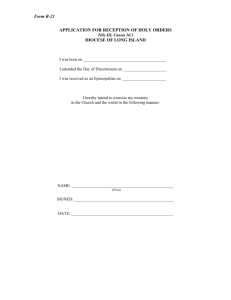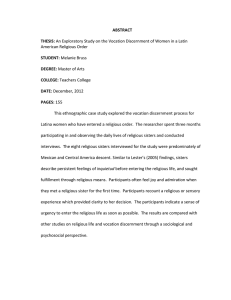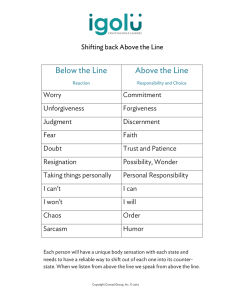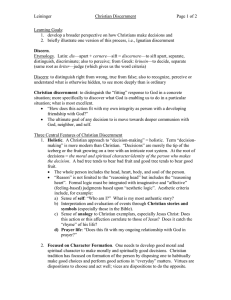Practicing Christian Discernment
advertisement
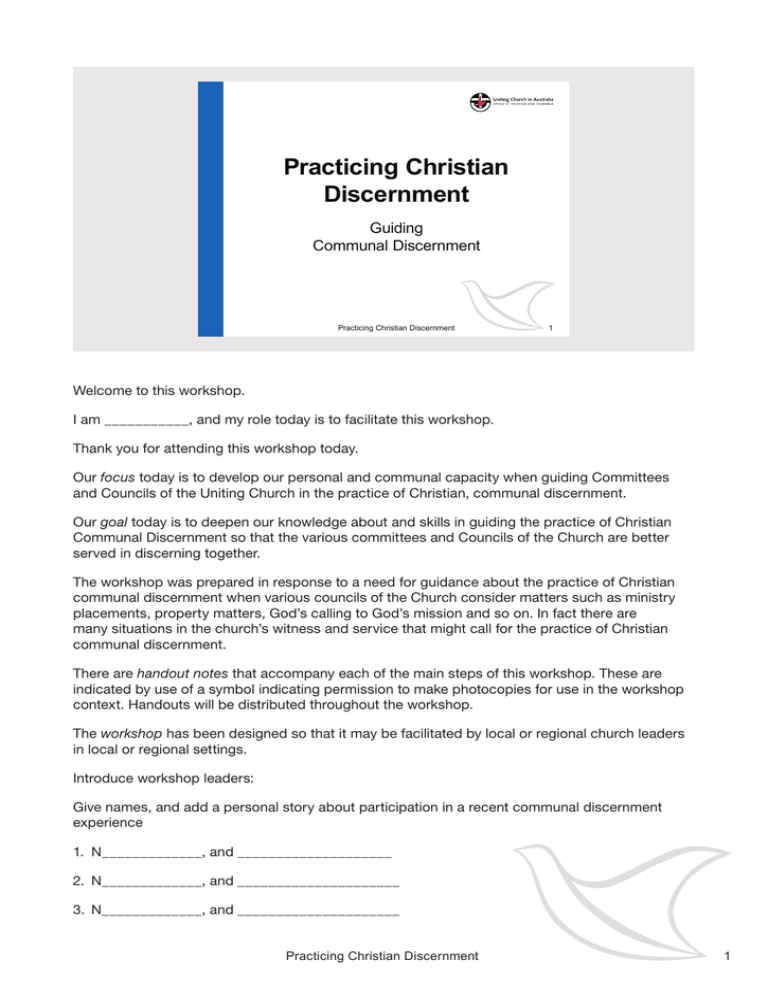
Practicing Christian Discernment Guiding Communal Discernment Practicing Christian Discernment 1 Welcome to this workshop. I am ___________, and my role today is to facilitate this workshop. Thank you for attending this workshop today. Our focus today is to develop our personal and communal capacity when guiding Committees and Councils of the Uniting Church in the practice of Christian, communal discernment. Our goal today is to deepen our knowledge about and skills in guiding the practice of Christian Communal Discernment so that the various committees and Councils of the Church are better served in discerning together. The workshop was prepared in response to a need for guidance about the practice of Christian communal discernment when various councils of the Church consider matters such as ministry placements, property matters, God’s calling to God’s mission and so on. In fact there are many situations in the church’s witness and service that might call for the practice of Christian communal discernment. There are handout notes that accompany each of the main steps of this workshop. These are indicated by use of a symbol indicating permission to make photocopies for use in the workshop context. Handouts will be distributed throughout the workshop. The workshop has been designed so that it may be facilitated by local or regional church leaders in local or regional settings. Introduce workshop leaders: Give names, and add a personal story about participation in a recent communal discernment experience 1. N_____________, and ____________________ 2. N_____________, and _____________________ 3. N_____________, and _____________________ Practicing Christian Discernment 1 A prayer for discernment Practicing Christian Discernment 2 Distribute Hand out #1 – a prayer for discernment This prayer is based on a prayer for God’s guiding presence in Christian communal discernment. It is a prayer used in the Anglican Church of Australia. Some changes have been made. Practicing Christian Discernment 2 Leadership that prays, listens, discerns… “If Christian mission is about, “seeing what God is doing and joining in”… then discernment & the cultivating of an environment which enables discernment are the leadership capacities most needed at this time”. Graham Cray, The Discerning Leader, Grove Books, 2010 Practicing Christian Discernment 3 Today we take time to consider one of the most foundational of the Christian practices, communal discernment. Bishop Cray, the Church of England’s Bishop for Fresh Expressions of Church and other missional initiatives, reminds us that leadership of any church or Christian community has a critical role to play in preparing and equipping the people of God to be a people of discernment. The quote also reminds us that the purpose of discernment is to know God, not just the will of God. During the workshop today, we will consider some of the following: • A definition of Christian communal discernment – what, exactly, are we talking about • A typical movement Christian communal discernment might engage – what shapes and informs any journey of communal discernment • Tools that are useful aids to the journey of Christian communal discernment – such as questions, forms of prayer, critical thinking • Dispositions a group or community might take – reflecting on an appropriate image for a social architecture to discernment • Explore a case studies – to see what Christian communal discernment might look like in practice • Introduce some ‘handy hints’ for Discernment guides or discernmentarians - the term given to a community engaged in discernment. Throughout this workshop we will apply the typical movement of a discernment journey to our learning task, at least, as much as is possible within the time available. Practicing Christian Discernment 3 Discernment – a Christian practice As a Christian spiritual practice, discernment is • purposeful • communal • established • repeated • meaningmaking • faith-in-action • coherent • &complex Practicing Christian Discernment 4 The Uniting Church’s Manual for Meetings begins with an introduction to the Christian practice of communal discernment. “When a council of the church makes decisions, it is aiming to discern the guidance of the Spirit in response to the word of God.” But then notes that “Discernment is not something for which we can set down rules” In this workshop we will explore several movements typical to the Christian practice of discernment. As a Christian spiritual practice, discernment is • done with a purpose – to listen with and to the Spirit of God • done together as a communal activity and in a spirit of cooperation • socially established - repeated many times • connects people to their Christian traditions, the teaching of scripture about living the Way of Jesus and the Spirit of God • embodies Christian values • is internally coherent and complex. Discernment is one of many Christian practices, which, when taken together form a whole way of Life. Discernment may be described as a means to: • recognize and acknowledge what God is doing and what God desires; • see a situation from God’s perspective; • uncover, rather than make, a decision; • listen to the Holy Spirit, who prays within and among us. Practicing Christian Discernment 4 Definition of discernment Discernment – uncovering • isagift from God, • tocultivatesensitivitytoGod’spresence • andnourishadesireforGod’spurposes • involvesahumble yielding of control, • g rowingthroughsensingGod’sgracious, freeing presence • isaboutknowing God Practicing Christian Discernment 5 There are many definitions of Christian communal discernment, but this one includes the main aspects of the many. This definition emphasises the practice of discernment as a Godly gift on one hand, while being realistic about the discipline the practice requires on the other. At a time when our social and community environments are increasingly dominated by an overwhelming sense of time, the static ‘wall paper’ noise of a world that cannot bear silence, and the chattering clamour of extroverted personalities and technological media - the Christian practice of discernment calls for a very different rhythm. That of listening, considered conversation, stillness, silence, waiting, letting go or ‘shedding’, uncovering and agreeing together. Many business leaders and leaders of social enterprise have been trained to value a pyramid of ‘time, quality and costs’, where at least one dominates the other two in any project or matter of concern. A Christian practice of discernment calls for a different order of priorities. Faithfulness, justice, compassion, companionship , grace, honesty, love… these are some of the priorities included in the Christian practice of discernment. Practicing Christian Discernment 5 Discernment as a means to: • sensewhatGodisdoing,desires; • trustthatbeingknownbyGodhelpsusto‘see’a situationdifferently,withtheaidofGod’sSpirit’s enlightenment • ‘uncover’,ratherthan‘make’adecision; • listentotheHolySpirit,whoprayswithinand among us. Practicing Christian Discernment 6 Discernment is a Christian practice with an purpose. It is not a practice as an end in itself. We discern together in order to know God, and to know God’s guidance in all matters of our commitments and decision making. Christian communal discernment is one of the Christian practices that lies close to the heart of what it means to faithfully follow Christ. We can expect that there will be an outcome of having engaged in Christian communal discernment. Not only will we be aware of the journey we have taken together. We will also be aware of what have been uncovered as we have engaged in this journey. And, hopefully, we will be delighted and perhaps even surprised at what the Spirit of God has guided us into as a result of the discernment journey. Perhaps one way to speak of Christian discernment is to consider the practice one of aligning our awareness and being with God. In so doing perhaps we will uncover what God has for us in any given situation. Practicing Christian Discernment 6 Community and discernment Christian Discernment is practiced in community • ManualforMeetings–1.2–1.3p7-p9 • Theologicalunderstanding1.2andBoUpara3 • B uildingasenseofcommunity1.3andattending to group dynamics Practicing Christian Discernment 7 Distribute Handout # 2 – Manual for Meetings – Chapter One, p7 – p11 There is a saying that neighbours are people who are located next door to each other. Community is what happens when neighbours relate to each other in all the matters of everyday life. For the Uniting Church, community develops when members of the church or group share in a common life, and especially when they share in the life and mission they have in and through of Jesus Christ. The Basis of Union put its this way: “the Church’s call is serve that end: to be a fellowship of reconciliation, a body within which the diverse gifts of its members are used for the building up of the whole, an instrument through which Christ may work and bear witness to himself” (para 3) And again: “Baptism into Christ’s body initiates people into Christ’s life and mission in the world, so that they are united in ne fellowship of love, service, suffering and joy, in one family of the Father of all heaven and earth, and in the power of the Spirit…” (para 7) And again: “The Uniting Church acknowledges that Christ alone is supreme in the Church, and that he mat speak to it through any of its councils. It is the task of every council to wait upon God’s Word and to obey God’s will in the matters allocated to its oversight…” (para 15) Refer to handout #2 to outline the way we may be expected to behave (group dynamics) when discerning. Practicing Christian Discernment 7 Discernment as a movement One model: 7 movements. 1. Naming the issue 2. Clarifying the information 3. Reasoning the issue through 4. Prayerful resting 5. Perceiving the uncovered knowing 6. Shedding–lettinggo 7. Agreeing together Practicing Christian Discernment 8 Distribute Handout #3 – “God is still speaking the creative word.” This handout outlines 7 movements to a Christian practice of discernment. (Read through the list of 7 movements) In the light of the guidance given by the Manual for Meetings, 1.4 – 1.5, we might add ‘Building community’, although building community is involved throughout the practice and is actually one of the blessings of the practice of communal discernment. Councils, Boards, committees and groups meet to do engage in their various responsibilities for oversight, management and so forth. Each time these bodies meet, they do so as an expression of the Church, the body of Christ. Therefore each time these bodies meet, allocating time for activities that • re-establish relationships, • celebrate commonalities • share in the joys and struggles of following Christ in particular settings and callings • focus the purpose of the body and its relationship to the wider church • centre the group on its relationship with Christ in and through the Spirit of God All contribute to nourishing the community nature of the church that meets this in this form and manner. Tell a short story or two to provide an example of Church bodies or groups you are familiar with taking time to build community when they meet. Use Handout #3 to outline the 7 movements of a typical discernment journey. Practicing Christian Discernment 8 Naming Agreeing Shedding Clarifying Discernment as a movement Perceiving Reasoning Resting Practicing Christian Discernment 9 This slide depicts the flow of a communal Christian discernment journey. It is of course idealised. No spiritual journey is as logical as this diagram suggests. Ask participants to share their experiences of discernment in the light of this diagram, using paper plates to rearrange the order of the steps to reflect ‘the flow’ they have experienced. What changes or refinements might they suggest? Most of the processes the Uniting Church applies in matters such as: • placing an ordained person to ministry • undertaking a mission study or development of a mission planning exercise • deciding what might be an appropriate course of action with respect to property can make implement a flow to the necessary journey of discernment. However, from time to time ‘the flow’ might reflect a different arrangement or sequence of the steps, especially if there is a repeated inner cycle of ‘naming, clarifying, reasoning’. The role of the ‘discernment partner’ , usually another Council of the Church such as the presbytery or Synod, is to encourage and coach the community or group discerning into such a flow. Sometimes, another Council of the Church might appoint a person or small group to act as ‘discernment guide’ as a means to assisting the group or community in its discernment journey. (See & distribute Handout of Page 3.) The BOMAR book, “Discerning Mission and the Use of Property” sets out the role of a Discernment Partner, See Page 3 Before You Begin, point 2. Practicing Christian Discernment 9 Naming the issue Trytogetthetoheartofthematter • N amingtheissueinasfewsentences as possible. • Namingdoesnotmeandescribingorexplaining. • Whatareweonabouthere,now? Practicing Christian Discernment 10 Naming an issue can take time. Often, the presenting issue or issues are masks for the real issue. Take time to listen to each other, Invite both affirmations as to what the issue might be, as well as listening carefully for differences of opinion. When there is agreement about the focus or heart of an issue, see if it can be ‘named’ in a brief paragraph of no more than 3 sentences. The greater the clarity about the ‘name’ of the issue, the more focused the discernment journey will be. Practicing Christian Discernment 10 Clarification means asking questions Ask questions to: • retainfocus • reviewprogress • identifycomplexities • ‘staythedistance’ • checkpredisposition,attitudes,behaviours • engageimagination • Identifywhatisbeinguncovered • testconsensus Practicing Christian Discernment 11 Distribute hand #4 – Asking questions in critical to the practice of discernment. There are various questions that might be asked. The Handout has a selection of typical questions. Questions can also be asked to test possible leadings of the Holy Spirit, such as: a.Is this leading in keeping with the Word of God as revealed in Jesus Christ through Scripture? b.Are there examples from the past that may provide direction for the present? c.Is this leading self-serving, or is it motivated by love for God and others? d.Does it matter who gets the credit? e.Is the ministry of Jesus continued in what we do? f.Will the wider community benefit or be blest by this initiative? g.Will the outcome build up the body of Christ for its call to God’s mission? We might add questions such as: a.Will any harm be done if we implement this outcome • to the reputation of the gospel; • to the church; • to the relationships & communities to whom we have been called and sent? b.Is now the time to implement this outcome? c.Are we ready, or what must we do not get ready, to implement this outcome? d.The Synod Property Materials website has a set of questions with respect to discerning mission motivated development (MMD). There are 10 sets of questions each associated with one of the 10 MMD principles. Distribute Handout #5 MMD questions Practicing Christian Discernment 11 Reasoning the issue through using right questions • Right questions vs THE right question • Activelistening • Transformingquestions –from‘how’to‘what’ –from‘who’to‘me/us’ Practicing Christian Discernment 12 Questions are like keys. They can unlock doors than lead us into new spaces and places of knowledge. Questions are a critical tool when we work together to make meaning of our experiences. We have already talked about some of the little jobs that questions do for us. (See the previous slide) ‘Right’ questions - Searching for THE right question, we can think that if this particular question is asked then exactly what is required will be revealed. However, THE right question always appears elusive. Perhaps it depends on who asks, the perspective from which it is framed and worded, the timing of the asking, or even who is asked the question that makes the search for THE right question so frustrating. Another way to think of questions is to think about ‘RIGHT questions’, rather than THE right question. Cultivating the practice of forming and asking ‘right questions’ is about developing ‘strong questions’. This means that the questions will avoid ‘yes’ or ‘no’ answers. They will engage how higher reasoning abilities. When answering right questions we will be required to work together as a community, take time, research, think critically, assess, weigh-up, evaluate, make complex judgements… It is worth taking time to frame a question as a ‘right question’ before it is asked. ‘Right’ questions inevitably invite the one who asks to change, rather than the other to whom the question might be directed. Ask questions such as, “what commitments can I / we make?” rather than, “how can we get the other people to be more….” We can only change our own behaviour! Active listening – (demonstrate) “so, what I think I hear you saying is” – encourages conversation by clarifying the message sent is the message received. Transforming questions – see Handout titled - ‘From How to What’. “How” questions focus the answer on other people’s responsibilities and capacities. We cannot change another person or group, but we can change our ourselves and our own behaviours. “What” questions encourage us to identify actions we will take, attitudes we will adopt, relationships we will engage, and knowledge we will apply. Practicing Christian Discernment 12 “How do we imagine ourselves? Who are we in this journey, what roles do we play, how do we act?” Choose a guiding image • Engineer – structure, process, planning • Economist – results, outcomes, dividends, benefits • Artist –spirituality, imagination, vision, values Practicing Christian Discernment 13 Social architecture means the image a group has of itself and the rhythm of work it embraces as a result. Here are 3 ways a group can imagine itself: Engineer, economist, artist. We are particularly familiar with the first two. Engineer - The group that sees itself as an ‘engineer’ sees itself as responsible to construct or to make something. What skills are necessary? Mostly, we can recognise the engineer at work through skills such as strategic planning, structural thinking, analysis and conceptual development. A lot of Church Councils work as if they are engineers, busily constructing the future church, or designing an putting in place structures that will support the future church. Engineers are driven by what works and keeps working. Economist - The group that sees itself as an ‘economist’ is concerned with outcomes, productivity, value for money, and benefits to the share holders – the Church. Mostly, we recognise the economist when discussion about ministry, mission property and future growth focuses on these factors in the life of the local or regional church. Economists are not driven by values, or vocation, but by results. Artist - The group that sees itself as an ‘artist‘ is concerned about rhythm, flow, colour, space, proportion, perspective, story… Mostly, we recognise the artist when we seek creative innovations. Artists not only imagine different ways of being – relating with others, living together, identifying and solving problems etc. Artists also sculpt, paint, dance or write poetry to bring to birth what they have imagined into a life others can appreciate and interact with. Artists are driven by values, vision, vocation and story. How we see ourselves will inevitably shape the way we behave, belong and believe. All of which impacts and influences communal discernment. Take time to ‘test’ the way in which the discerning community images itself in this journey. Consider the impact of this imagery on the journey itself, people’s behaviour and the uncovering that might occur. Perhaps seek more of a balance between the images Practicing Christian Discernment 13 Case study one – What now? A rural story – • r eviving • recentmigrants • changefromanimal based agriculture to viticulture • growthinsmallscale, intense, niche food industry • traditionalcommunity organisations Church & buildings – • r educingcongregation • worshiproom,hall, toilets, kitchen, furniture • visitation • monthlylunch • ministrychanges • What now? Practicing Christian Discernment 14 Use the Handout ‘Case Study’ Form small groups of 3 to 4 people. Distribute flip chart paper (3 or 4 sheets) and textas for each small group Task the small groups: “Your task in small groups is to first review the details in the Case study, then to discuss and record your responses to the following questions or tasks.” We will be using a method known as Peer Circling to explore this case study. I will introduce this method to you after we have taken some time to read the case study. Give time for personal reading of the case study. Allow time for note making or marking the text of the case study in a suitable manner. Practicing Christian Discernment 14 Task – PeerSpirt Circling Christina Baldwin ‘Calling the Circle’ 3 principles • L eadershiprotates • Responsibilityisshared • Centreisheldbyreliance ontheSpirit 3 practices • L istenattentively • Speakintentionally • Contributetogroup wellbeing 4 agreements • S hareinconfidence • Listencompassionately, with curiosity • Askforwhatweneed, offer what we can • Periodicallypauseto regather throughs & focus Practicing Christian Discernment 15 We have chosen a method known as PeerSpirit Circling to reflect on the case studies. PeerSpirit circling is the work of Christina Baldwin and is set out in her book, Calling the Circle, published by Bantam,1998. Please for circles of between 7 and 9 people. As Facilitator, I appoint ‘Circle Hosts’. Circle Hosts ensure that the 3 principles and 4 agreements of the circling are observed. They also manage the time use for the circling journey. There will be 3 rounds of just 10 minutes each. Round One – Asking questions: • What is the presenting issue in this case study? • What might be the main underlying, semi-disclosed issue? Round Two – Clarifying our comprehension • Use a flow chart to outline a discernment journey for considering the main issue presented in this case study. • Identify what possible distractions to this flow working in reality. • Identify what might be let go or ‘shed’ in order to uncover a better way? Round Three – Identifying what has been uncovered. Instructions: Round One – one person speaks at a time, other make notes, no verbal response. Listen carefully to the questions. 2 min / person Round Two - each person offers their perception of the issues through the lens of the questions. Some answers are offered. Round Three – each person suggests an uncovering. When each has shared, conversation is open to shape 1 to 5 core uncoverings. After Round three is complete, invite each small group to share its work. Facilitator might comment as appropriate. Practicing Christian Discernment 15 Prayerful resting Multiple approaches… • Scripturetoreadandreflecton – Byassociation-similaritytothecurrentstory – Byimitation-apatternofactionworthcopying – Byprinciple-principledactiontofollow • Prayers • Contemplativeexercise – Holygazing,lectiodivinawithart • Guidedmeditation Practicing Christian Discernment 16 There are many different ways to engage in prayer, various forms of prayer to use. The important element to this movement within Christian communal discernment is not the resting, but the prayer. And it is best experienced as prayer–ful resting. Each person participating in the discernment can be expected to continue reading and mediating on scripture, and engaging in various practices of prayer. Remember, we are waiting to hear God speak to us. God often speaks through mediation on scripture and in our contemplative disciplines. Here are some methods others have found valuable to prayerful resting. • cripture to read and reflect on S –By association - similarity to the current story –By imitation - a pattern of action worth copying –By principle - principled action to follow • Prayers • Contemplative exercise – Holy gazing, lectio divina with art • Guided meditation Practicing Christian Discernment 16 Perceiving WherewasGodinthisresting? WhatwasGod’swordtome/tous? WhatcalldowehearinGod’swordtousatthis time,inthiscontext,aboutthismatter? Whatcommitmentsmightframeourresponse toGod’swordtous? Practicing Christian Discernment 17 Perceiving is about recognising what has gradually been ‘uncovered’ as we have journeyed through the previous steps of communal discernment. These questions can be asked of the group or community as a whole, following the prayerful resting. It will be necessary to gather the group or community and to provide time for everyone to share their responses together. Perceiving is an activity that cannot be rushed, so remember to allow time for this step. Also, a skilled facilitator might be required to ensure that every voice is heard, irrespective of office held or roles played. This is not about exercising power, Perceiving is about listening in humility and with great care. The Manual for Meetings provides guidelines for a ‘Deliberative Session’ in which perceiving styled questions might be engaged. See Section 3.4, page 14. Consider…. 1.Where was God in this resting? 2.What was God’s word to me/ to us? 3.What call do we hear in God’s word to us at this time, in this context, about this matter? 4.What commitments might frame our response to God’s word to us? Practicing Christian Discernment 17 Shedding – letting go • Identifying‘what’ • Providinga‘means’ – A ritual – A celebration and ending… • Really‘lettinggo’! • ‘Donotpassgo’until… Practicing Christian Discernment 18 Shedding or letting go is one the most difficult movements in an any experience of Christian communal discernment. Letting go carries with emotions as well as rationality. Many people can deal with the rationality of a well reasoned uncovering of what must be let go in order the new thing be brought to birth. But the emotions that accompany years of commitment and investment of human energy and capacities in a particular activity, program or relationship can be very difficult to prize away. When it comes to buildings, for example, many people do not stop to separate the building from their precious memories of experience and relationships associated with the building. So, selling a building can feel like losing memories, and even losing a part of oneself! This sort of differentiation is critical to discerning the future of property. Therefore, careful attention to deigning a process by which to ‘let go and let God’ is significant. Give adequate attention to pastoral dimensions of shedding, while at the same time staying firm about actually letting go. Vision is a major contributor to enabling people to shed, or let go. Vision, energised by a holy imagination, encourages and calls people forth into the new commitment that has been uncovered in the communal journey of discernment. Practicing Christian Discernment 18 Uncovering the decision • Manual for Meetings – Chapter4-Howwemakedecisions • ‘Uncovering’ratherthan‘deciding’ Practicing Christian Discernment 19 The UCA’s process for uncovering the decision is addressed the Manual for Meetings, Chapter 4. We speak of ‘uncovering’ because we understand that the decision is already known to the Holy Spirit, and that our contemplative journey to date has been to align our knowing with that of the Spirit. Recall Acts 15:23B to 29. This is the letter from the Apostles and Elders who gathered in Jerusalem for the Church Council meeting to discern whether or not, an if so with what conditions, the good news about Jesus Christ might be inclusive of gentiles. Note v28: for it seems good to the Holy Spirit and to us… This is an account of ‘uncovering’ rather than deciding. All along the pathway of discernment we have been seeking to listen for and with the Holy Spirit. Now, having journeyed through an intentional process of discernment, gaining insight and setting aside things that might have distracted or diverted us, we are ready to give voice to that which has been uncovered. Uncovering requires our strongest attention to God’s Holy Spirit among us, our clearest thinking and our commitment to the way uncovered. Uncovering is not so much about strategy and priority as it is about knowing the mind of God on the matter before the community. Practicing Christian Discernment 19 Handy hints • G roup dynamics – who is playing what roles, when andwhere? • S taying on track – dealing with distractions • M anaging behaviours –workingwithpeople! • S ustaining our Spiritual course – nurturing the community’ssoul Practicing Christian Discernment 20 Speak to these points as experience suggests. Use these points to reinforce the concepts and practices this presentation has outlined. Practicing Christian Discernment 20

